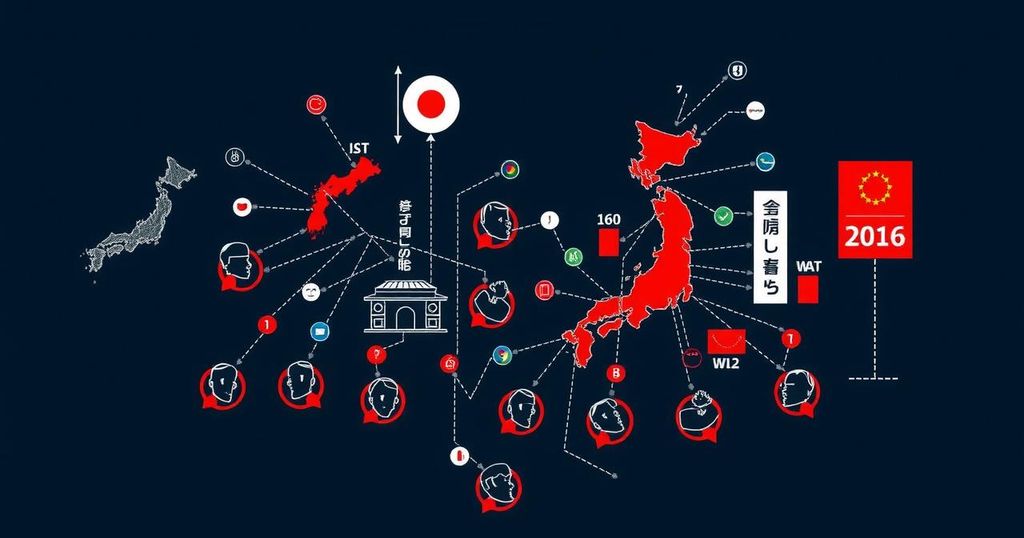Ahead of the October 27 snap election, dissatisfaction with democracy is widespread in Japan. Prime Minister Shigeru Ishiba’s Liberal Democratic Party faces declining favorability amid scandals, with only 30% of citizens supportive. Many feel politically unaligned, contributing to low voter turnout, as a mere third express satisfaction with democracy.
In anticipation of the upcoming snap election scheduled for October 27, Japan is experiencing widespread dissatisfaction with its democratic processes. Newly appointed Prime Minister Shigeru Ishiba has called for this early election as a means to secure a public vote of confidence for his administration. The Liberal Democratic Party (LDP), which has governed Japan for nearly 70 years, faces significant challenges following a series of scandals that have undermined its reputation. A recent survey conducted by the Pew Research Center from January 5 to March 9, 2024, revealed alarming sentiments among the Japanese populace regarding their political landscape. The survey, which involved 1,003 Japanese adults, was conducted amid a slush fund crisis that resulted in the indictment of several LDP lawmakers. Notably, only 30% of respondents expressed a favorable view of the LDP, with a staggering 68% holding an unfavorable perspective. This marks the lowest favorability rating the LDP has recorded in seven years of polling. Interestingly, the dissatisfaction is not limited to the LDP; the primary opposition party, the Constitutional Democratic Party (CDP), enjoys only a 29% favorable view, reflecting a general discontent with political alternatives. Furthermore, a considerable 56% of Japanese adults reported that they do not feel a close affiliation with any political party. This lack of connection is compounded by low levels of voter enthusiasm, contributing to Japan’s status as one of the OECD countries with the lowest voter turnout rates, despite automatic voter registration. The survey also indicated that only about one-third of Japanese citizens express satisfaction with the state of democracy in the country—a decline that has persisted since 2019. However, there remains a distinct divide in satisfaction levels; individuals with a favorable view of the LDP reported a satisfaction rate of 58%, while those with an unfavorable opinion of the party expressed just 19% satisfaction. As Japan approaches this pivotal election, the data underscores a notable shift in public sentiment towards its longstanding governing party, raising questions about the potential impact on future governance and political engagement in the nation.
Japan’s political framework has long been dominated by the Liberal Democratic Party, which has maintained power for 65 of the past 69 years since its founding in 1955. This longevity is unusual in comparison to other democratic nations, where political leadership tends to change more frequently. With the call for a snap election and the context of recent ethical scandals, an assessment of public opinion is crucial for understanding the challenges facing Japanese democracy today. The Pew Research Center’s survey provides vital insights into the attitudes of Japanese citizens regarding their political leaders and the state of democratic practices in the country. It appears that dissatisfaction with political institutions has reached significant levels, particularly amid scandals that have rocked the ruling party. Despite the opposition’s efforts, the general public sentiment indicates a lack of trust and a disconnect from established parties, which could hinder participation in the electoral process and governance.
In summary, Japan finds itself at a critical juncture as it approaches the October 27 snap election, marked by a significant decline in public support for the Liberal Democratic Party and a pervasive sense of dissatisfaction with its democratic processes. The recent Pew Research Center survey illustrates a troubling disconnection between the populace and their political representatives, highlighting the urgent need for reform and renewed public trust in governance. With voter turnout historically low, the upcoming election could determine the future of Japan’s political landscape and the effectiveness of its democratic institutions.
Original Source: www.pewresearch.org







